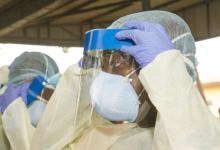
Typical street scene in Santa Ana, El Salvador. (Photo: iStock)
IMF Survey : Guinea Gets $37.7 Million In Extra IMF Financing to Help Combat Ebola
February 17, 2015
- IMF Executive Board approves release of $25.9 million under existing program
- Board also boosts financing under program by additional $37.7 million
- Guinea sets up special budget account to channel Ebola-related spending
The IMF Executive Board approved release of $25.9 million to Guinea under the West African country’s existing IMF-backed program, and also boosted financing under the program by an extra $37.7 million.

Health workers suit up in Conakry, Guinea, amid aggressive government efforts to control Ebola epidemic (photo: David Snyder/ZUMA Press/Newscom)
RESOURCES TO FIGHT EBOLA
The IMF said the move aimed to enhance Guinea’s international reserves, cover its budget, and meet urgent balance of payments needs resulting from the Ebola crisis.
The package of extra IMF financing for Guinea comes on top of $100 million in debt relief funded by IMF grants, announced earlier this month. The debt relief followed $130 million in emergency assistance the IMF disbursed in September 2014 to the African countries worst hit by the Ebola outbreak—Guinea, Liberia, and Sierra Leone.
An IMF statement said the Board completed a review of Guinea’s economic performance under a program supported by a three-year Extended Credit Facility loan of $199 million approved in February 2012. All quantitative performance criteria had been met, but with the authorities focused on combating the Ebola outbreak, structural reforms had slowed and implementation of some benchmarks had been delayed. The program was extended to end-December 2015.
IMF staff said in a report that Guinea’s 2015 economic policies would support the fight against the Ebola outbreak, which looks set to persist well into the year and tip the economy into recession this year. The staff said a concerted international effort is required to help the authorities fully implement their Ebola response plan.
Special budget account
Guinea’s 2015 budget projects a wider deficit, in part to allow Ebola-related spending. Guinea’s authorities have created a special budget account to channel resources such as grants and concessional loans into Ebola-related spending. IMF staff noted that the special account would also help to ensure transparency and provide assurances to donors.
In its report, IMF staff said the Ebola outbreak had slowed Guinea’s economy, with 2014 growth projected at 0.4 percent compared with 2.3 percent in 2013. Economic activity was severely hampered by border closures and controls, population displacements that created farm labor shortages, fewer international visitors, and a falloff in foreign investment.
Guinea’s Ebola infection rate slowed and leveled out at the end of 2014, the report said. While concentrated in the south-east border region with Liberia and Sierra Leone, the epidemic has lately extended north toward bauxite and gold producing regions of the country.
The government continues its aggressive efforts to control the epidemic, the report noted. In the fourth quarter of 2014 five new treatment centers were opened, bringing the total to seven.
For 2015, the report projected further economic disruption, including from second-round effects of the Ebola epidemic such as enterprise closures and labor layoffs. Production and investment would be hindered by limited labor supply and mobility, while investment would likely take time to recover due to investor risk aversion and lower commodity prices.
Uncertainty in 2016
Uncertainty clouds Guinea’s medium-term outlook, the report said. Eradication of the Ebola epidemic this year should allow a broad-based recovery in activity and a GDP growth rebound in 2016. But persistent Ebola outbreaks beyond 2015 and a continued fall in commodity prices could reduce investor interest in developing Guinea’s large mining potential.
Prospective growth and investment could also be adversely affected by continued delays in structural reforms, caused mainly by Ebola-related diversion of administrative resources and delays in planned external technical assistance. In addition, renewed sociopolitical tensions and political uncertainty could arise ahead of presidential elections scheduled for late 2015.







